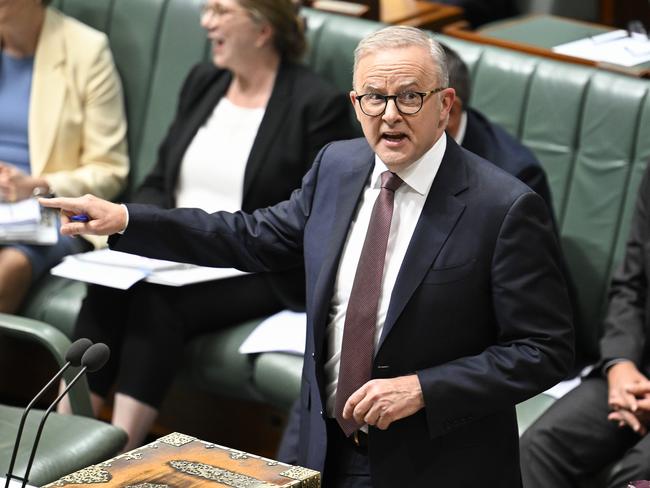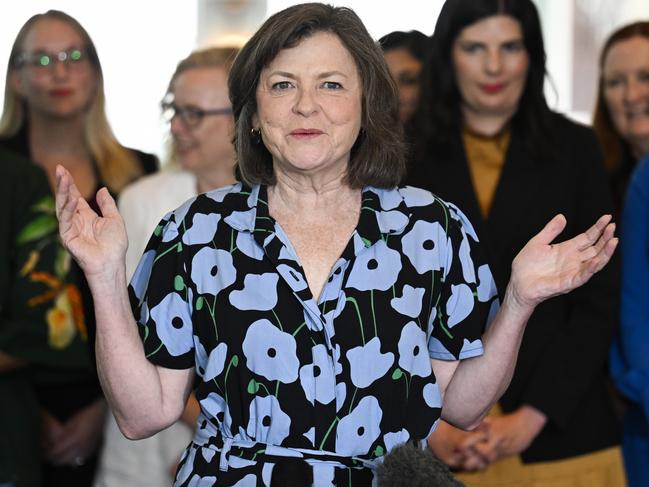The Albanese government has committed half a billion for attracting the health-conscious female voter
Given the health outcomes for the two sexes, that women’s relationship with the healthcare system should be front and centre of the government’s priorities, is, well, weird.
James Campbell
Don't miss out on the headlines from James Campbell. Followed categories will be added to My News.
There’s a great little chart on the Australian Institute of Health and Welfare’s website which illustrates better than words could ever do, the state of men and women’s health in this country.
Entitled “Deaths in Australia by sex and age group” the chart is the last word in the ultimate health outcome for all men and women.
Women have of course always tended to live longer than men. As of 2022, life expectancies at birth in Australia of 85.3 years for girls and 81.2 for boys.
What the aforementioned chart does is to translate this rather abstract gap into a visual representation of the chances of being one of the unfortunate people who leave us each year.
It’s an extremely sobering chart if you are male.

After an early start in which the sexes are roughly equally likely to exit, males quickly start to show females a clean pair of heels in the death stakes.
Of the kids in 2022 who died between 10 of 14 years-old, 59 per cent were male.
Between 15 and 19 it was 68 per cent.
Of those who checked out in their 20s, 70 per cent were male.
And though the percentage of male deaths started to ease off a bit after that, it did so very slowly.
Even between the ages of 70 and 74, six out of the ten people who shuffled off this mortal coil in 2022 were men.
In fact it’s not until you get to people aged 80-85 that more women than men started dying.
Why is this so?
Well leaving aside the non-medical reasons for dying – being murdered, killing yourself either accidentally or deliberately etc – all of which we excel in, men are also sicker than women.
We are more likely to get cancer, more likely to have heart disease and less likely to go to the doctor in time when we’ve got them.
The reasons why we are more likely to have these ailments is of course that we tend to smoke more, drink more and eat bad food in greater quantities.
There’s also a genetic factor at play – having two X chromosomes would seem to be an advantage in living longer.
In other words, women don’t just live longer, they’re generally more healthy than men and more likely to see a GP or a specialist when things go wrong.
So if you were the government and was serious about doing something about the burden of disease in this country, you would make it clear to everyone that improving men’s health was going to be your top priority, wouldn’t you?
You could start by having an assistant minister with orders to make it their focus.
You might also set up a National Men’s Health Advisory Council and task it with ways of closing the gap.
And to make sure everyone in Government knew it was a priority you could produce an annual Status of Men Report Card, which for good measure might track the appalling education outcomes for boys.
And if you’d done all this work when the next election approached you might be able to triumphantly announce you were going to put an extra $573 million to show you were prioritising the sickest half of the population.
I mean it would be daft to focus your energies on the healthier half of the population wouldn’t it?
Instead as Assistant Minister we’ve had Ged Kearney who has been focused on the “many ways that gender bias creeps throughout our health care system,” presiding over a “gender audit” of the Medicare Benefit Scheme.
There’s also a shiny new advisory body to tell the government what it should be doing on women’s health plus an annual report card on the status of women.

As of last week there’s also half a billion for attracting the health-conscious female voter.
The opening sentence of the terms of reference for the National Women’s Health Advisory Council can – for once correctly – be described as ironic.
“A significant body of research,” it begins, “has identified there are important health disparities between men and women.”
Ya don’t say!
No one’s saying women’s health isn’t important and there is no doubt either that women have legitimate gripes about their treatment at the hands of the medical profession – especially in doctors’ habits of ignoring their complaints when they are in pain.
But given the health outcomes for the two sexes, that women’s relationship with the healthcare system should be front and centre of the government’s priorities, is, well, weird.
For generations women have rightly complained that in running the world, men – either negligently or deliberately – have ignored their interests.
You can hardly say it’s therefore surprising that the “the first majority female government in Australia’s history,” as Labor MPs are always reminding us, should have reversed the biases.
But just because it is predictable doesn’t make it right.




